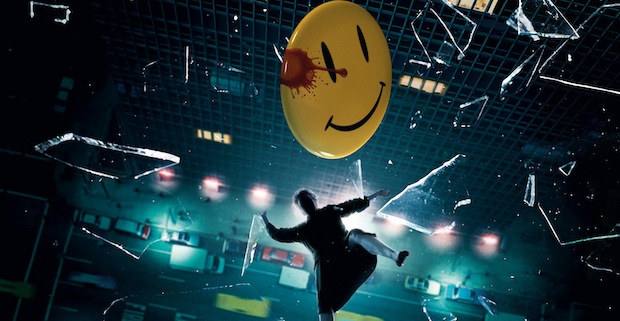
Written by UTG critic Grace Duffy, Scene & Heard takes a look at the music that makes our favorite films so memorable. Whether it’s the 400-piece orchestra Christopher Nolan used for The Dark Knight, or the dozen or so bands that contributed to the soundtrack of Top Gun, there is no denying the impact music has on movies and this column hopes to highlight the best of the best.
If you have a suggestion for a film we should cover on Scene & Heard, please contact us by emailing utgjames@gmail.com.
Watchmen is pretty much universally celebrated amongst my film-loving brethren as a stirring and mesmeric adaptation of the influential graphic novel. I’m not sure if this opinion prevails elsewhere but I, em, didn’t actually like it all that much – and I’ve gone back to it a few times to try to convince myself otherwise. Be that as it may, I can acknowledge three stellar aspects to the movie: the character of Rorschach is brilliantly realised, the soundtrack is incredible, and there are some nice fangirly aesthetics that I should probably keep to myself (they may or may not begin with Matthew and end with Goode). Staying on topic then, the soundtrack is a pitch-perfect accompaniment to the film, lending it an indispensable dimension and gravitas without which the experience would be sorely lacking.
In one of those rare cinematic feats, the movie’s association with great music begins with the trailer, which is set to the Smashing Pumpkins’ “The End Is the Beginning of the End.” The latter track is a gorgeously dark, bass-driven monstrosity that serenades the mostly wordless mire of the promo – and Watchmen has a damn good trailer, almost more enjoyable to behold than the movie itself. Billy Corgan’s nasal whine sets an early and telling tone of pessimism and detachment, which is tinged ever so slightly with poignancy as we glimpse the Comedian’s funeral. The rain-soaked US flag is a soggy remnant of the ideals and principles for which the broken society was once to stand, before it descended into the bitter, murky dystopia so vividly conjured by the book and the film.
On that note, Bob Dylan’s presence was always going to be assured. His insightful and zeitgeist-tapping songs have spoken to and for an entire generation, the same people whose hollow-eyed ghosts inhabit Alan Moore’s dreadful vision. A sense of thinly-veiled doom and hysteria permeates the movie, visually represented by the ever-tightening doomsday clock and the sordid debauchery into which the populace has thrown itself. Dylan himself performs “The Times They Are A-Changing,” a frequent inclusion in any film set during this era. It plays during the film’s opening montage, depicting how superheroes first rose to prominence and became involved in government work, as well as how some of them lost their way or even their lives. It’s a sobering and ever-affecting track, with a staggering honesty and prescient tone that laments the passage of time as much as it heeds it. Dylan’s wearied voice is in perfect harmony with the increasing gloom and disillusionment presented onscreen, and the piercing sound of his harmonica cuts right to the viewer’s heart.
“The Sound of Silence” by Simon and Garfunkel is used as the backdrop to The Comedian’s funeral. It’s a troubling, very haunting song that seems to weave its way right into your psyche. Yet, when it kicks off, there’s something quite at odds in the flair of the music next to the lonely lyrics. There’s a greyness and discoloration to the whole funeral scene that matches this paradox – you can sense how apart the sparse mourners, former colleagues suddenly thrown back together, must be. It’s difficult to grieve for such a bastard, and there’s a slightly numbed twang to that song that seems to reflect this. The flashback scenes throughout the film reveal him to be such a gruff, violent, macho presence, and yet the funeral is so procedural and emotionless that it’s like he was never there. The song then is a constant, lingering presence, as out of sorts as everyone seems to be, just sort of hanging there like the incessant rainfall.
Berated though the scene may be, “Hallelujah” by Leonard Cohen is a surprisingly inspired choice to accompany the token awkward sex scene. In this, Cohen’s original incarnation, it’s actually stunningly sleazy, a characteristic that the innumerable covers often sacrifice. Its use here is, therefore, quite sneeringly perfect as Cohen’s leering vocals waft throughout a moment that even director Zack Snyder acknowledged was supposed to be “ridiculous.” One can’t help feeling a tad voyeuristic – if not second hand mortification too – in watching the scene unfold, sentiments Leonard is clearly out in sympathy with.
Watchmen’s soundtrack can be grim and miserable at times, elysian and uplifting at others. Tracks like “Unforgettable” by Nat King Cole nestle snugly alongside the anarchic cover of “Desolation Row” offered by My Chemical Romance, suggesting both the familiarity of the era and the wide-eyed dismay at this otherworldly vision of it. Even if you’re an oddball like me and weren’t quite blown away by the film, the music is easy to love and will leave few unmoved.
- 2015’s Most Underrated Films - December 29, 2015
- Passing The Torch: The End Of An Era For UTG - December 1, 2015
- UTG PREMIERE: Before The Streetlights – “Private Browser” - November 26, 2015

